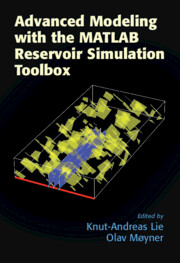Book contents
- Frontmatter
- Contents
- List of Contributors
- Preface
- Acknowledgments
- Navigating the Book and the MRST Modules
- Part I Grid Generation, Discretizations, and Solvers
- Part II Rapid Prototyping and Accelerated Computation
- Part III Modeling of New Physical Processes
- 7 Using State Functions and MRST’ls AD-OO Framework to Implement Simulators for Chemical EOR
- 8 Compositional Simulation with the AD-OO Framework
- 9 Embedded Discrete Fracture Models
- 10 Numerical Modeling of Fractured Unconventional Oil
- 11 A Unified Framework for Flow Simulation in Fractured Reservoirs
- 12 Simulation of Geothermal Systems Using MRST
- 13 A Finite-Volume-Based Module for Unsaturated Poroelasticity
13 - A Finite-Volume-Based Module for Unsaturated Poroelasticity
from Part III - Modeling of New Physical Processes
Published online by Cambridge University Press: 20 November 2021
- Frontmatter
- Contents
- List of Contributors
- Preface
- Acknowledgments
- Navigating the Book and the MRST Modules
- Part I Grid Generation, Discretizations, and Solvers
- Part II Rapid Prototyping and Accelerated Computation
- Part III Modeling of New Physical Processes
- 7 Using State Functions and MRST’ls AD-OO Framework to Implement Simulators for Chemical EOR
- 8 Compositional Simulation with the AD-OO Framework
- 9 Embedded Discrete Fracture Models
- 10 Numerical Modeling of Fractured Unconventional Oil
- 11 A Unified Framework for Flow Simulation in Fractured Reservoirs
- 12 Simulation of Geothermal Systems Using MRST
- 13 A Finite-Volume-Based Module for Unsaturated Poroelasticity
Summary
In this chapter, we present fv-unsat, a multipoint finite-volume–based solver for unsaturated flow in deformable and nondeformable porous media. The latter is described using the mixed form of Richards’ equation, whereas the former by the equations of unsaturated poroelasticity. The module aims at flexibility, relying heavily on discrete operators and equations, exploiting the automatic differentiation framework provided by the MATLAB Reservoir Simulation Toolbox (MRST). Our examples cover two numerical convergence tests and two three-dimensional practical applications, including the water infiltration process in a nondeformable soil column and a realistic desiccation process of a deformable clay sample using atmospheric boundary conditions. The resulting convergence rates are in agreement with previously reported rates for single-phase models, and the practical applications capture the physical processes accurately.
Keywords
- Type
- Chapter
- Information
- Advanced Modeling with the MATLAB Reservoir Simulation Toolbox , pp. 515 - 548Publisher: Cambridge University PressPrint publication year: 2021
- Creative Commons
- This content is Open Access and distributed under the terms of the Creative Commons Attribution licence CC-BY-NC-ND 4.0 https://creativecommons.org/cclicenses/
- 2
- Cited by

